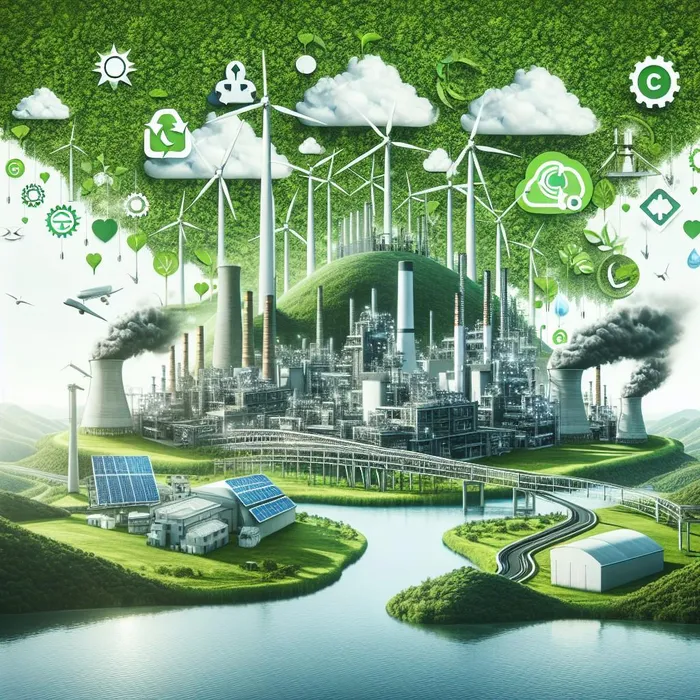
The global climate agenda has entered a decisive decade, says the author.
Image: AI Lab
The global climate agenda has entered a decisive decade. The April 2022, flooding in KwaZulu-Natal overwhelmed economic and social infrastructure and forced Toyota’s Prospecton assembly plant to halt production for four months. That kind of disruption is exactly the kind which manufacturing firms face firsthand, and a crude awakening on the what the hard knock of climate impacts on production can and are becoming.
The impact affected production lines and logistics routes but also disrupted suppliers across and into the province, demonstrating how physical risks cascade through industrial ecosystems. Similarly, the 2023/24, drought cut national maize yields by roughly 15%, affecting agro-processing and food exports. From agriculture to automotive, the message is clear: climate resilience is now a pillar of economic competitiveness. Building adaptive infrastructure and climate-proof logistics, has to be integral to South Africa’s re-industrialisation agenda.
Across the world, climate strategy has become industrial strategy. Major economies are aligning trade, technology, and climate policy through ambitious industrial packages. The question is no longer based on a false dichotomy of growth versus industrialisation, but how to decarbonise competitively, preserving industrial capacity, jobs, and market access for trade while building the foundations for a new wave of green growth.
For developing economies, these shifts bring both opportunity and pressure. The EU’s Carbon Border Adjustment Mechanism (CBAM), which begins full implementation in 2026, will apply carbon tariffs to imports of steel, aluminium, cement, and fertilisers. South Africa’s CBAM-exposed exports exceed €1.1 billion (R22bn), or about 5% of total exports.
Unless exporters reduce carbon intensity in their products, they risk higher costs, reduced demand, and long-term market erosion, for example, the 2029 list of export products that will be liable for Carbon Border Adjustment Mechanism (CBAM) will be expanded to include much of what SA exports to the EU, requiring exporters to plan for the eventual effect.
Technological Risk: Staying Ahead of a Moving Frontier
Technological disruption is reshaping global supply chains. South Africa’s automotive sector, worth R268.8 billion in exports in 2024, remains heavily reliant on internal-combustion engines. With major markets phasing out fossil-fuel vehicles, the technological risk is immediate and structural. But the threat extends beyond automotive sector. Globally, manufacturing faces technology obsolescence as plants unable to adopt cleaner energy- efficient systems lose space in the global market.
Despite the risks, there are potential opportunities that can facilitate South Africa’s path to low-carbon and green industrialisation. Demand for critical minerals, including platinum-group metals, manganese, and vanadium, is soaring as global electrification accelerates.
South Africa’s mineral base, manufacturing experience, and renewable resource endowment position it well to be a central part of emerging green-industrial value chains.
With some of the world’s best solar and wind potential, South Africa can build renewable-energy manufacturing, green-hydrogen value chains, and circular-economy industries that help existing sectors transition. Done right, this is not only a climate response, but also a platform for industrial renewal and competitiveness.
Delivering a competitive transition depends on institutions that connect policy design and industrial execution. The Presidential Climate Commission (PCC) plays a coordinating role, aligning government, business, and labour around coherent mitigation, adaptation, and just- transition strategies.
The Industrial Development Corporation (IDC) complements this through its Sustainable Industrialisation Pathways, which combines its climate response with its industrialisation mandate, considering the socio-economic objectives of the country. The IDC identifies four key pathways:
The Way Forward
The first Global Stocktake, an assessment of the world’s collective progress toward achieving the Paris Agreement’s long-term climate goals, concluded at COP28 in Dubai, and marked the end of the Paris Agreement’s initial assessment phase. As we near UNFCCC 30 th Conference of Parties COP30 in Brazil, the focus has shifted from accounting to implementation, from assessing progress to accelerating action backed by finance.
South Africa’s green industrialisation relies on effective implementation, robust policies, and strong institutions to build investor confidence through alignment of climate and industrial strategies that drives decarbonisation. Coordinated climate finance from institutions and partners is needed for innovation and private investment, driving sustainable industrial renewal and inclusive economic growth.
The world is not waiting. Trade, finance, and investment are already shifting toward green economies. For South Africa, success will depend on how quickly it aligns climate ambition with industrial competitiveness.

David Jarvis, is Acting Chief Operations Officer at the Industrial Development Corporation and Commissioner of the Presidential Climate Commission.
Image: Supplied
David Jarvis, is Acting Chief Operations Officer at the Industrial Development Corporation and Commissioner of the Presidential Climate Commission.
*** The views expressed here do not necessarily represent those of Independent Media or IOL.
BUSINESS REPORT